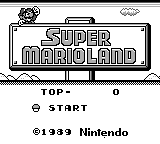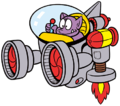Super Mario Land: Difference between revisions
| Line 340: | Line 340: | ||
*''[[Super Mario Run]]'': The Remix 10 song contains a portion of the Dungeon theme. | *''[[Super Mario Run]]'': The Remix 10 song contains a portion of the Dungeon theme. | ||
*''[[WarioWare Gold]]'': This game contains [[Super Mario Land (microgame)|a microgame]] based off of ''Super Mario Land'', which involves Mario throwing [[Superball]]s at enemies. | *''[[WarioWare Gold]]'': This game contains [[Super Mario Land (microgame)|a microgame]] based off of ''Super Mario Land'', which involves Mario throwing [[Superball]]s at enemies. | ||
*''[[Super Mario Maker 2]]'': The [[Superball Flower]] is an obtainable | *''[[Super Mario Maker 2]]'': The [[Superball Flower]] is an obtainable power-up for the ''[[Super Mario Bros.]]'' style. | ||
==Trivia== | ==Trivia== | ||
Revision as of 20:21, June 26, 2019
- This article is about the game Super Mario Land. For the series as a whole, see Super Mario Land (series). For the microgame from WarioWare Gold of the same name, see Super Mario Land (microgame).
- Not to be confused with Super Mario 3D Land.
Super Mario Land is a game originally released as a launch title for the Game Boy in 1989 and later rereleased for the Nintendo 3DS's Virtual Console in 2011. Unlike preceding platform games of the Mario franchise, the game takes place in Sarasaland rather than the Mushroom Kingdom. Super Mario Land also introduced the character Princess Daisy, this game's damsel in distress. An evil alien named Tatanga is the main villain, and most enemies in the game are not related to creatures found in earlier Mario games. Unlike previous Super Mario games, Super Mario Land was not developed by Shigeru Miyamoto and Nintendo's EAD division but by Nintendo R&D1, with Gunpei Yokoi as guiding producer.
The game is the first (and shortest) of the three Super Mario Land games, its sequels being Super Mario Land 2: 6 Golden Coins (which marks the first appearance of Wario) and Wario Land: Super Mario Land 3 (which is the first installment in the Wario Land series). They were originally excluded from the main Super Mario series, but were included alongside the more traditional games for the 30th anniversary of Super Mario Bros.[1], and the history page from the Mario Portal and "The official home for Mario" websites[2][3].
Story
Story from the Instruction Booklet
Once upon a time, there was a peaceful world called Sarasaland. In this world there were 4 kingdoms named Birabuto, Muda, Easton and Chai. One day, the skies of Sarasaland were suddenly covered by a huge black cloud. From a crack in this cloud, the unknown space monster Tatanga emerged to try to conquer Sarasaland. Tatanga hypnotized the people of all the kingdoms so that he could control them in any way he liked. In this way he took over Sarasaland. Now, he wants to marry Princess Daisy of Sarasaland and make her his queen. Mario came to know of these events, and he has started on a journey to the Chai Kingdom where Princess Daisy is held captive, in order to restore peace to Sarasaland. Can Mario defeat Tatanga, release people from his interstellar hypnosis, and rescue Princess Daisy? It's all up to you and Mario's skill. Go for it Mario!
In order to save Daisy, Mario must make his way through all of the four kingdoms, defeating the enemies that inhabit them. The four kingdoms are led by the Sphinx King Totomesu, sea dragon Dragonzamasu, moai Hiyoihoi, and cloud Biokinton. After beating Biokinton, Mario, in his plane the Sky Pop, must battle Tatanga himself in his heavily armed ship, the Pagosu. After defeating Tatanga, Mario rescues Daisy and the two ride off together in a spaceship.
It is revealed in the sequel, Super Mario Land 2: 6 Golden Coins, that Wario used the events in this game to take over Mario's castle. Tatanga is seen with a Golden Coin, presumably working under Wario.
Description from the Nintendo eShop
Ancient ruins, giant crabs, Koopa Troopas, flying stone heads, and hungry sharks await you in this rerelease of the 1989 Game Boy™ game. In the beautiful kingdom of Sarasaland, a mysterious alien has appeared and hypnotized the inhabitants while kidnapping Princess Daisy™ for himself! Travel over land, in the air, and underwater as Mario™ runs, jumps, and bounces his way to fortune and glory on his mission to save Princess Daisy and restore peace! Ancient ruins, tempestuous waters, and brand new challenges await!
Gameplay
Super Mario Land is very much similar to previous Mario platformer games. The allows the player to jump, while the
is the action command, and will make Mario run faster. The
controls where Mario walks or runs. Also the player can pause anytime with the
. Jumping on an enemy will defeat it, and the player will earn points for doing so. When Mario is Superball Mario, or if he is driving the Marine Pop or Sky Pop, the
will fire out projectiles at Mario's enemies.
All the Bosses, except for Biokinton and Tatanga, can either be beaten by physical attack, or by jumping on a switch behind the Boss. Collecting 100 coins will gain Mario an extra life, and if he manages to earn 100,000 points (Done by defeating enemies, as mentioned above), he will gain an extra continue, usable in the event all lives are lost.
Mario is vulnerable in his small size, but when he gets a Super Mushroom, he will grow slightly in size and is now able to take damage without losing a life. However, if he does get hit in this state, he will turn back into normal Mario. If Mario collects a Superball Flower, he will become Superball Mario, and will be able to shoot Superballs at his enemies. If Mario happens to find the rare item, the Star, he will become invincible, and be able to defeat any enemy just by touching it. The effects wear off over time, however.
At the end of every non-boss level, the player reaches a Goal tower with two entrances. The lower entrance takes Mario directly to the next stage, while the upper entrance sends him to a Bonus Game for the chance to win either a flower or a maximum of three extra lives.
Controls
Game Boy
: Jump
: Run; throw superball (as Superball Mario)
: Move
: Pause
Nintendo 3DS
: Jump
: Run; throw superball (as Superball Mario)
: Move
: Pause
Hard mode
After beating the main game, the Mushroom icon on the title screen changes to Mario's head. A game begun from this has additional enemies spread throughout the levels, though no further changes occur. Beating the "Mario head" game unlocks a level select.
As the game has no battery backup, the title screen reverts to the standard version on switching the Game Boy off, resetting the game or the batteries running out.
Enemies
About 30 different kinds of enemies appear in Super Mario Land. Most of them are exclusively found in a certain kingdom. The only recurring enemy of previous Mario titles is the Piranha Plant, which goes under its Japanese name Pakkun Flower. A few creatures are related to enemies of earlier Mario games, but most of them are unique to Super Mario Land. Notably, their English names are generally very similar or identical to the Japanese names, with the only exception being Kumo, which is not the case for other localizations of Super Mario platformers.
Common enemies
| Image | Name | Description |
|---|---|---|
| File:Goombo.PNG | Goombo (originally known as "Chibibo") |
Acts like any other Goomba, walking forward until it hits a wall, where it turns back, or off a cliff, where it falls. Can be defeated with a single stomp or superball for 100 points. |
| File:Nokobonartwork.PNG | Bombshell Koopa (originally known as "Nokobon") |
A cross between a Koopa Troopa and a Bob-omb. If stomped, turns into a bomb that cannot be moved and explodes a short time later, damaging Mario if the explosion touches him. Worth 100 points if stomped or superballed. |
| Piranha Plant (originally known as "Pakkun Flower") |
Pops out of both right-way-up and upside-down pipes. Can only be defeated with a superball, for 100 points if facing up or 400 points if upside-down. | |
| Bullet Biff (originally known as "Gira") |
Missile which fires from a variant Bill Blaster that periodically emerges from pipes. Can be stomped for 400 points. Immune to superballs. | |
| Falling slabs | Appear in 1-3 and 4-1. Can only be dodged, not defeated. |
Birabuto Kingdom enemies
| Image | Name | Description |
|---|---|---|
| File:Fly SML.png | Fly | Bounces sideways. Can be defeated with one stomp or two superballs for 400 points. |
| File:Bunbun.png | Bunbun | Found only in 1-2. Flies horizontally, pausing periodically to drop spears. Can be stomped or superballed for 800 points. |
| Gao | Found only in 1-3 in standard mode (also 1-1 in Hard Mode). Sits still and breathes small balls of fire diagonally in Mario's direction, similar to a Fire Piranha Plant. Can be stomped or superballed for 800 points. | |
| File:King Totomesu artwork.PNG | King Totomesu (Boss) | Very similar to the Bowser fights from Super Mario Bros., this lion breathes fireballs horizontally and periodically jumps. Can be defeated with five superballs for 5000 points, or dodged to hit the kill switch behind him. |
Muda Kingdom enemies
| Image | Name | Description |
|---|---|---|
| File:Honenartwork.PNG | Honen | These undead torion jump vertically from offscreen, similar to Podoboos, but can be stomped or torpedoed for 100 points. Immune to superballs. |
| File:Yurarinbooartwork2.PNG | Yurarin Boo | Jump vertically, breathing fireballs diagonally in Mario's direction. Can be stomped or hit with two torpedoes for 400 points. Immune to superballs. |
| File:Mekabonartwork.PNG | Mekabon | Found only in 2-2. Turn back at edges. Throw their heads at Mario, which can be stomped for 100 points but regenerate. The headless body can be stomped for 100 points, or the whole robot for 400 (100 points with a Star), both of which finish them off. |
| File:Torionartwork.PNG | Torion | Found only in 2-3 in groups of three, which make a U-turn when they reach the left edge of the screen. Can be killed with a single Marine Pop torpedo for 100 points. |
| File:Yuraranartwork.PNG | Yurarin | Found only in 2-3. Move right-to-left in a semi-random diagonal pattern. Can be killed with two torpedoes for 400 points. |
| File:Gunionartwork2.PNG | Gunion | Found only in 2-3. Can be killed with three torpedoes for 800 points, but then turn into two fireballs which move in Mario's direction. |

|
Tamao | Bounces around the boss area when fighting Dragonzamasu. Damages Mario when touched, but cannot be destroyed. |
| File:Dragonzamasuartwork.PNG | Dragonzamasu (Boss) | A giant Yurarin Boo which moves up and down, shooting fireballs. Can be killed with twenty torpedoes for 5000 points, or the player can attempt to clear the way to the kill switch. |
Easton Kingdom enemies
| Image | Name | Description |
|---|---|---|
| File:Batadonartwork.PNG | Batadon | Bounces along, similar to a Fly or Kumo but somewhat higher. Can be stomped or eliminated with three superballs for 800 points. |
| File:Tokotokoartwork.PNG | Tokotoko | Runs quickly. Can be stomped or superballed for 400 points. |
| Ganchan | Simple boulders. While they damage Mario if they hit him, Mario can stand on them to cross spikes or to reach the Bonus Game Goal entrance in 3-1. Cannot be destroyed. | |

|
Suu | Found only in 3-2. Drop down from the ceiling at Mario, like slow Thwomps. Can be stomped or eliminated with two superballs for 400 points. |
| File:Kumoartwork1.PNG | Kumo | Behave identically to Flies, and can also be defeated with one stomp or two superballs for 400 points. |

|
Falling Spike | Disguised as part of non-damaging ceiling decoration, but fall when Mario comes near. Can be dodged but not destroyed. |
| File:Hiyoihoiartwork.PNG | Hiyoihoi (Boss) | Throws ganchan at Mario. Can be defeated with ten superballs for 5000 points, or Mario can use the boulders to jump over Hiyoihoi and hit the kill switch. |
Chai Kingdom enemies
| Image | Name | Description |
|---|---|---|
| File:Pionpiartwork.PNG | Pionpi | Zombie-like creatures that bounce at Mario. Stomping them gives 800 points, but only stuns them briefly, similar to Dry Bones. Two superballs are required to actually finish them, also for 800 points. |

|
Pompon Flower | Appear only in 4-2. Similar to a cross between a Volcano Plant and a Ptooie, they walk around, occasionally shooting a damaging spore vertically. They can be defeated by a stomp or two superballs for 800 points. |
| Nyololin | Appear only in 4-2. A snake with the same attack pattern as a Gao, which can also be defeated by a stomp or superball for 800 points. | |

|
Kaitensuru Honō | Flame rotating around a central block, which does damage to Mario if he touches it. Invulnerable. |
| File:Chickenartwork.PNG | Chicken | Appear only in 4-3. Tend to appear in loose clusters, and be brought down by a single Sky Pop missile for 400 points. Also thrown out by Biokinton. |
| Roketon | Appear only in 4-3. and be defeated with one missile for 400 points. Fire Bullet Biffs backwards at Mario once past him, but do not fire anything forward (despite the official art). | |
| File:Chikakoartwork.PNG | Chikako | Appear only in 4-3. Float in mid-air, do not fire projectiles and require ten missiles to be destroyed for 800 points, or the use of a Star to destroy for 400. |
| Genkotsu | Appear only at the end of 4-3. Function like slightly faster Piranha Plants that "punch" downwards. Cannot be destroyed. | |
| File:Biokinton SML.png | Biokinton (Boss) | Bounces all around the boss area, throwing chickens at Mario. To defeat him, he must be hit with twenty missiles, bringing forth Tatanga. |

|
Tatanga (Final Boss) | Moves around the right of the arena, firing large cannonballs, which almost immediately split into three smaller cannonballs, at Mario. These also absorb missiles, taking several hits before being dispersed (for 100 points), making it harder to shoot the Pagosu. Once the warship is destroyed, Tatanga and the boss room vanish. |
Levels
| World | Image | Levels | ||
|---|---|---|---|---|
| World 1 Birabuto Kingdom |
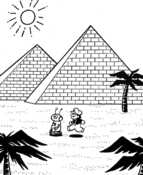
|
World 1-1 | World 1-2 | World 1-3 |
| World 2 Muda Kingdom |
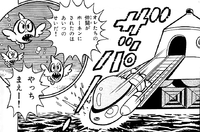
|
World 2-1 | World 2-2 | World 2-3 |
| World 3 Easton Kingdom |
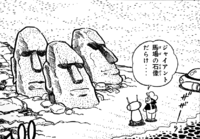
|
World 3-1 | World 3-2 | World 3-3 |
| World 4 Chai Kingdom |
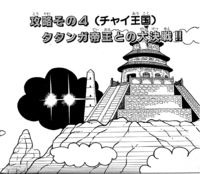
|
World 4-1 | World 4-2 | World 4-3 |
Revision
Later printings of the game featured alterations to the soundtrack[4] and fixed the screen wraparound glitch of the original release[4]. Unusually for a Virtual Console version, the 3DS release of Super Mario Land is based on the original version rather than the 1.1 revision[4].
Development
- See also: List of Super Mario Land staff
Super Mario Land was initially set to be the pack-in game for the Game Boy. However, Henk Rogers of Bullet-Proof Software managed to convince NOA president Minoru Arakawa that Tetris would have wider appeal[5].
The game was developed by Nintendo R&D 1 rather than by Nintendo EAD, making it the first Super Mario platformer to not be developed by EAD. Gunpei Yokoi acted as the producer and future R&D manager Satoru Okada was the director. Hirokazu Tanaka handled the sound effects and soundtrack.
Soundtrack
To tie in with the game's Japanese release, an original soundtrack for the game was published in that region by Nippon Columbia, featuring arrangements of ten of Tanaka's compositions by Ikuro Fugiwara, and performed by the "Mario Freaks Orchestra."
Reception
| Reviews | |||
|---|---|---|---|
| Release | Reviewer, Publication | Score | Comment |
| Nintendo 3DS | Corbie Dillard, Nintendo Life | 7/10 | "Super Mario Land was impressive when it was first released for the Game Boy, but given how the length and overall quality of Game Boy releases increased shortly thereafter, it only made this original seem even more inadequate by comparison. It's not the best launching-off point for the 3DS eShop — Super Mario Land 2: Six Golden Coins is by far the better game — and it is the most expensive of the launch Virtual Console titles at $3.99/£3.60. It's still a very fun Super Mario experience, but just about the time things are really getting good, the experience ends and the credits roll. If you haven't played Super Mario Land before, you owe it to yourself to at least give the game a try. The quest might be fairly short, but it's still worth playing through at least once, if only to see where Mario's portable adventures began." |
| Nintendo 3DS | Adam Riley, Cubed3 | 8/10 | "Despite not particularly ageing too well, looking graphically rather shabby and not offering a considerable amount of challenge or any replay value, at its heart Super Mario Land is still a fantastic piece of history in the platform genre, and a thoroughly enjoyable romp for Mario fans in general." |
| Aggregators | |||
| Compiler | Platform / Score | ||
| GameRankings | 77.94% | ||
Sales
The game received great sales, being the best selling Game Boy game with over 18.17 million copies sold, and the third best selling portable Mario game, only being surpassed by New Super Mario Bros. and Mario Kart DS.
Gallery
- For this subject's image gallery, see Gallery:Super Mario Land.
- King Totomesu artwork.PNG
- Pionpiartwork.PNG
Media
- For a complete list of media for this subject, see List of Super Mario Land media.
Glitches
- Main article: List of Super Mario Land glitches
References in later games
- Super Smash Bros. Melee: One of Peach's alternate costumes is based on Daisy's classic design.
- WarioWare, Inc.: Mega Microgame$!: The microgame Grow Wario Grow features Mario's sprite and background graphics from the game.
- Super Smash Bros. Brawl: The Dungeon music of this game appears as one of the randomly-collectible music CDs for the World 1-2 version of Mushroomy Kingdom, as well as The Subspace Emissary's The Path to the Ruins (underground segment), The Ruins, and the parts of The Great Maze which are based on those two stages.
- Mario & Sonic at the Sochi 2014 Olympic Winter Games: A medley of Super Mario Land music was featured as one of the songs in Figure Skating Singles.
- New Super Mario Bros.: The method for defeating Bowser involved stomping on a switch near the end of the bridge, like in Super Mario Land.
- Super Mario 3D Land: Like above, the method for defeating Bowser and his mimics involved pressing a switch, like in Super Mario Land.
- Mario Kart 8: In the Water Park's submarine building, there is a sign which says that submarines were first used in 1989, which references the Marine Pop sections and the release year of Super Mario Land.
- Paper Mario: Color Splash: A remixed version of the credits theme is present in this game in the Roshambo Temples.
- Super Mario Run: The Remix 10 song contains a portion of the Dungeon theme.
- WarioWare Gold: This game contains a microgame based off of Super Mario Land, which involves Mario throwing Superballs at enemies.
- Super Mario Maker 2: The Superball Flower is an obtainable power-up for the Super Mario Bros. style.
Trivia
- This is the first Super Mario title not to feature Princess Toadstool or Toads, and the second Super Mario title not to feature Bowser or the Mushroom Kingdom.
- The back of the package and the Nintendo eShop description for the game state that Koopa Troopas appear, when in fact, only Bombshell Koopas appear. It also mentions "giant crabs," despite no crabs appearing in the game.
- Super Mario Land is notable for its inclusion of unique and different sound effects compared to the traditional Super Mario titles.
External links
References
| Super Mario Land | |
|---|---|
| Protagonists | Mario • Princess Daisy |
| Bosses | King Totomesu • Dragonzamasu (Tamao) • Hiyoihoi • Biokinton (Chicken) • Tatanga (Pagosu) |
| Locations | Sarasaland (Birabuto Kingdom • Muda Kingdom • Easton Kingdom • Chai Kingdom) |
| Levels | World 1-1 • World 1-2 • World 1-3 • World 2-1 • World 2-2 • World 2-3 • World 3-1 • World 3-2 • World 3-3 • World 4-1 • World 4-2 • World 4-3 • Expert Level |
| Items & vehicles | Super Mushroom • Superball Flower • Star • 1UP heart • Coin • Marine Pop • Sky Pop • Switch • Lift Block |
| Enemies & obstacles | Batadon • Bombshell Koopa • Bullet Biff • Bunbun • Chikako • Dropping lift • Falling block • Falling spike • Fly • Ganchan • Gao • Gunion • Goombo • Honen • Kumo • Mekabon • Nyololin • Pionpi • Pipe Fist • Piranha Plant • Pompon Flower • Roketon • Roto Disc • Suu • Tokotoko • Torion • Yurarin • Yurarin Boo |
| Other | Brick • Bonus game • Das Super Mario Spiel • Gallery • Glitches • Goal • Main Theme • Media • Mystery Block • Sub-area • Soundtrack |
| Game Boy games | |
|---|---|
| Super Mario franchise | Alleyway (1989) • Baseball (1989) • Super Mario Land (1989) • Golf (1989) • Dr. Mario (1990) • Super Mario Land 2: 6 Golden Coins (1992) • Donkey Kong (1994) • Mario's Picross (1995) • Picross 2 (1996) |
| Donkey Kong franchise | Donkey Kong (1994) • Donkey Kong Land (1995) • Donkey Kong Land 2 (1996) • Donkey Kong Land III (1997) |
| Yoshi franchise | Yoshi (1991) • Yoshi's Cookie (1992) • Tetris Attack (1996) |
| Wario franchise | Wario Land: Super Mario Land 3 (1994) • Wario Blast: Featuring Bomberman! (1994) • Wario Land II (1998) |
| Miscellaneous | Tetris (1989) • The Legend of Zelda: Link's Awakening (1993) • Game & Watch Gallery (1997) • Game & Watch Gallery 2 (1997) |
